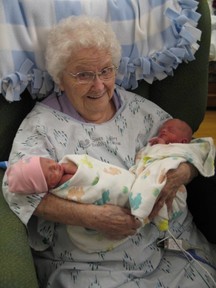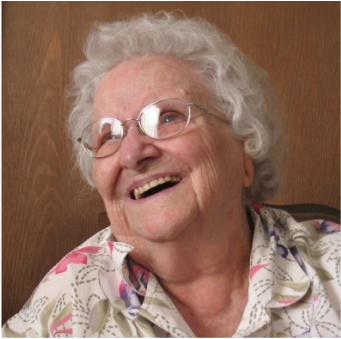
Tonight, as I tucked our second son into bed, I looked into his eyes and immediately felt tears spring to my own. We’d had a rough night—one of those ‘why did I choose this?’ kind of nights. Yet, as he laid down for sleep, I saw only the sweet, generous and thoughtful little boy who was loaned to me from heaven.
He was the first to speak and asked me, “Mom, how long ago did Gramma Lois die?” He caught me by surprise, and it took me a few beats to be composed enough to say, “Almost one year ago.”
I could see his lip quiver, so before tears could fall, I said, “She really loved us all, didn’t she?”
Remembering his great-great grandmother’s love brought an instant smile to our five-year-old’s face. His eyes sparkled at memories. We shared a couple favorite stories. Then, I challenged him.
“Son, we all made Gramma’s heart very happy, didn’t we?” Yes, he nodded. “Would Gramma’s heart be happy tonight?” He offered a small shake no. “Well then, I have an idea. Before you make a choice, you ask yourself, ‘would Gramma Lois be proud of me about this?’ If the answer is no, don’t do it.”
Apparently, that made sense, and he readily agreed. Before I could kiss him goodnight though, he caught me.
“Mom, would Gramma have been very happy with you tonight?”
Ouch! “No, son. She would have felt a bit sad to see me making bad choices.”
“Well, you better ask Gramma if what you’re doing is ok then, too. Right?”
And so, it’s agreed. Before we speak or act, we need to check with Gramma first. I can see her chuckle!
My parenting methods surely aren’t for everyone; sometimes, they aren’t even for us. However, that’s not the point of this little story.
The point is this.
Nearly one year ago, our family said good-bye to a truly beautiful woman. A woman who smiled and whistled softly even when she probably should have smacked someone upside the head. A woman who lived more than a century without complaint or fuss.
Gramma was very much human; however, to her great-great grandchildren, she was a vision of perfect love. They not only knew but also saw her love every time we visited. Wrong or right, Gramma was a tangible image of God—a higher power you don’t want to disappoint, who offers forgiveness even when you don’t deserve it.
The kids and I spoke to Gramma on the phone not long before she slipped away. We got to hear her say, “I love you”. In turn, we each got to share one last story, one last thank you, one last “I love you”.
She always used to tell me, “Oh dear, if I can just live to see you graduate high school, I’ll be happy.” Then, it was “graduate college.” Next came get married; then came have children. She was there for it all—the good, the bad and the ugly. Like all my grandparents, her time was the best gift ever.
I can’t mourn for my great-grandma. Despite pain, sadness and challenge, she lived a long, beautiful, full life. She doesn’t deserve my tears and sorrow.
Instead, she deserves my gratitude. Gramma Lois set an example, and the greatest testament to her life would be that we live up to it.
Gramma would say neither I nor anyone else owed her anything, but she’d be wrong. We owe her everything. Our payback should be to choose happy even when it’s easier to choose angry. We should choose family even when they make it difficult.
As the anniversary of her death approaches, I’m remembering her with a smile, a thank you, and a big plate of fresh pancakes … after all, if you left Gramma’s hungry, she must not have been home!
He was the first to speak and asked me, “Mom, how long ago did Gramma Lois die?” He caught me by surprise, and it took me a few beats to be composed enough to say, “Almost one year ago.”
I could see his lip quiver, so before tears could fall, I said, “She really loved us all, didn’t she?”
Remembering his great-great grandmother’s love brought an instant smile to our five-year-old’s face. His eyes sparkled at memories. We shared a couple favorite stories. Then, I challenged him.
“Son, we all made Gramma’s heart very happy, didn’t we?” Yes, he nodded. “Would Gramma’s heart be happy tonight?” He offered a small shake no. “Well then, I have an idea. Before you make a choice, you ask yourself, ‘would Gramma Lois be proud of me about this?’ If the answer is no, don’t do it.”
Apparently, that made sense, and he readily agreed. Before I could kiss him goodnight though, he caught me.
“Mom, would Gramma have been very happy with you tonight?”
Ouch! “No, son. She would have felt a bit sad to see me making bad choices.”
“Well, you better ask Gramma if what you’re doing is ok then, too. Right?”
And so, it’s agreed. Before we speak or act, we need to check with Gramma first. I can see her chuckle!
My parenting methods surely aren’t for everyone; sometimes, they aren’t even for us. However, that’s not the point of this little story.
The point is this.
Nearly one year ago, our family said good-bye to a truly beautiful woman. A woman who smiled and whistled softly even when she probably should have smacked someone upside the head. A woman who lived more than a century without complaint or fuss.
Gramma was very much human; however, to her great-great grandchildren, she was a vision of perfect love. They not only knew but also saw her love every time we visited. Wrong or right, Gramma was a tangible image of God—a higher power you don’t want to disappoint, who offers forgiveness even when you don’t deserve it.
The kids and I spoke to Gramma on the phone not long before she slipped away. We got to hear her say, “I love you”. In turn, we each got to share one last story, one last thank you, one last “I love you”.
She always used to tell me, “Oh dear, if I can just live to see you graduate high school, I’ll be happy.” Then, it was “graduate college.” Next came get married; then came have children. She was there for it all—the good, the bad and the ugly. Like all my grandparents, her time was the best gift ever.
I can’t mourn for my great-grandma. Despite pain, sadness and challenge, she lived a long, beautiful, full life. She doesn’t deserve my tears and sorrow.
Instead, she deserves my gratitude. Gramma Lois set an example, and the greatest testament to her life would be that we live up to it.
Gramma would say neither I nor anyone else owed her anything, but she’d be wrong. We owe her everything. Our payback should be to choose happy even when it’s easier to choose angry. We should choose family even when they make it difficult.
As the anniversary of her death approaches, I’m remembering her with a smile, a thank you, and a big plate of fresh pancakes … after all, if you left Gramma’s hungry, she must not have been home!

 RSS Feed
RSS Feed